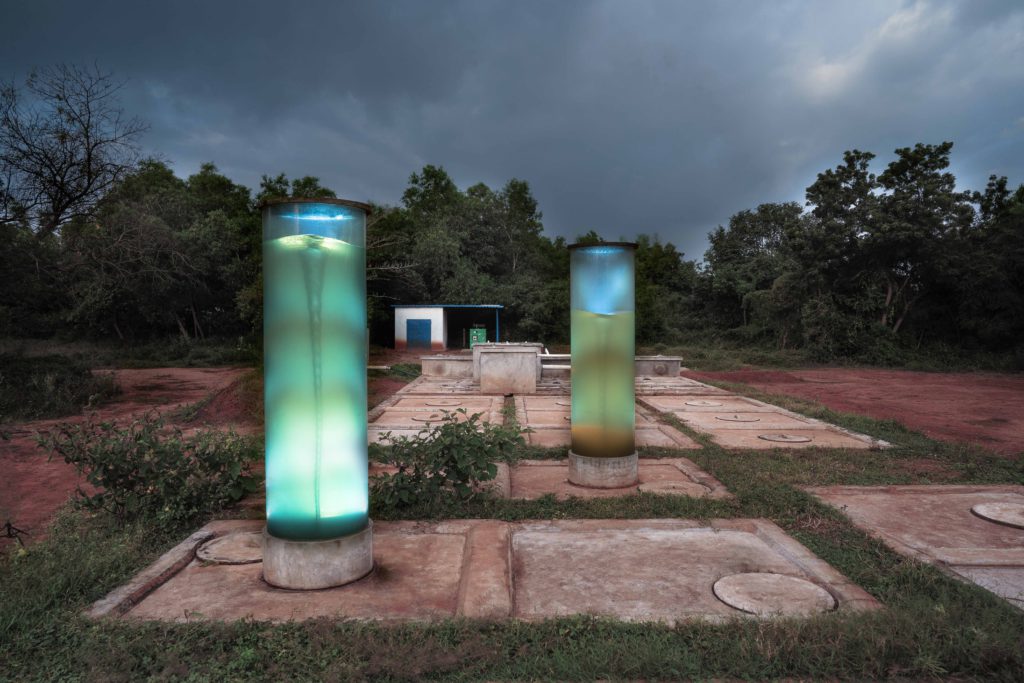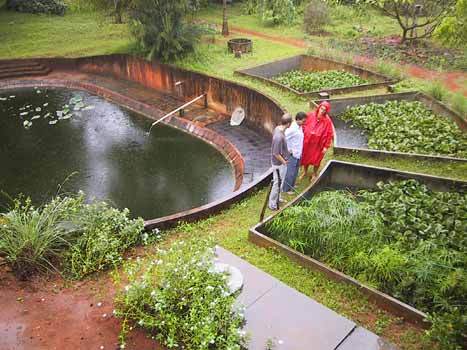While in India, most of the wastewater – particularly greywater- is released untreated into nature or treated with facilities using chemicals, in Auroville, the Center for Scientific Research (CSR) has successfully developed a system that relies solely on bacteria and plants, hence the term natural water treatment. We had the opportunity to interview Tency, the mastermind behind this achievement. His solution has been adopted in numerous natural water treatment facilities across India, helping to purify water without any chemicals while making it available for irrigation.

What led you to focus on wastewater treatment research?
“The wastewater treatment was one particular subject in which I got heavily involved because there was a passion to do something with the water that came out of the households. That’s a journey of more than 40 years where I had the help from an enormous number of people, specialists, people who were skilled in one area and trying to put it together. Ultimately, the CSR team was part of helping to develop a technology: natural wastewater treatment systems. In India, we were one of three organizations who tried to advance that technology. And I think CSR, with a couple of other Indian and foreign NGOs, continued.”
How does natural wastewater management work?
“Natural wastewater management systems rely on gravity-based flow, several settling tanks, and, at the end, we could add plant-based filtration, such as constructed wetlands, where plants and microbes break down pollutants. After the bacterial reaction, the treated water is ready to be reused as irrigation water or safely released into nature. This process mimics natural ecosystems, making it sustainable and low-impact. Here, in Auroville, we have implemented a dozen installations.”
Tency continues to explain the development and process. “To do so, we had a long period where we actually tried out different tips from visiting professors who gave us a lot of advice and leads to work with. The objective was always to purify water, but it’s a very costly technology if you want to do it properly. As we didn’t have sophisticated access to technology or to funding, we came up with something that we thought would work by using natural methods. So, we have developed systems using bacteria and microbes as the main cleaning agents. They are channeled to do the work of cleaning. It was a long, long road. We quickly found out that it works for domestic wastewater, but it doesn’t work for toxic wastewater. On domestic wastewater like grey and black water, it’s working very well.”

With water resources becoming increasingly scarce, how can wastewater management help address this challenge?
“In Tamil Nadu, we are going through a very long period of four to six months with no rain at all and hot weather. Water is necessary for the plants to grow. Wastewater management was developed to provide value to the freshwater we use daily. The main push was to do something about treating wastewater because Auroville is dependent on freshwater borewells. In the summer, they are very low and could dry out. So it’s good to have a substitute for agriculture and not use fresh water for everything. Out of 100 liters of freshwater that we use, after a natural treatment, we get 80 liters back for secondary usage. So we worked hard to reuse the wastewater from the households, purify it enough, and use it for irrigation.
“The easiest and where we reach absolute good treatment figures, which are analyzed according to the pollution reduction that the wastewater achieves, it’s for irrigation. That’s without any harm, without any health hazards; it can be used for irrigation outside. We went a step further, but it’s more high-tech. We also use it in some places for toilet flushing. But that’s when the client wants, and we make them aware that it needs added components in order to reach the level of purification.”
In the wastewater management workshops you lead, what key messages do you emphasize to participants?
“I explain and show the technology we use. We emphasize the beneficial aspects of natural wastewater treatment. It consumes little energy and relies on the natural abilities of bacteria and plants to purify water. Usually, the participants are not specialized in wastewater management. We also present our work on green energy, design, mobility and robotics technology. So everything is in one packet, and wastewater is one of the topics.”
You also work beyond Auroville—are there any specific projects you’d like to highlight?
“We have done more than 200 projects outside. Each project needs a small technical team, no high-tech team, to take care of the installation. Natural treatment systems need regular maintenance.
“Every project is mostly custom-designed. It’s difficult to standardize. You can do that in certain cases, but usually, sites are different. When you go to a place in the north or in the south of India, a standard solution is not efficient. With each site, we learn something, an additional good thing.“
What topics are you currently working on?
“The main focus for Auroville is to have the totality of a water resource management program or vision. Wastewater is a component of that. Managing rain and stormwater holds huge potential.”
